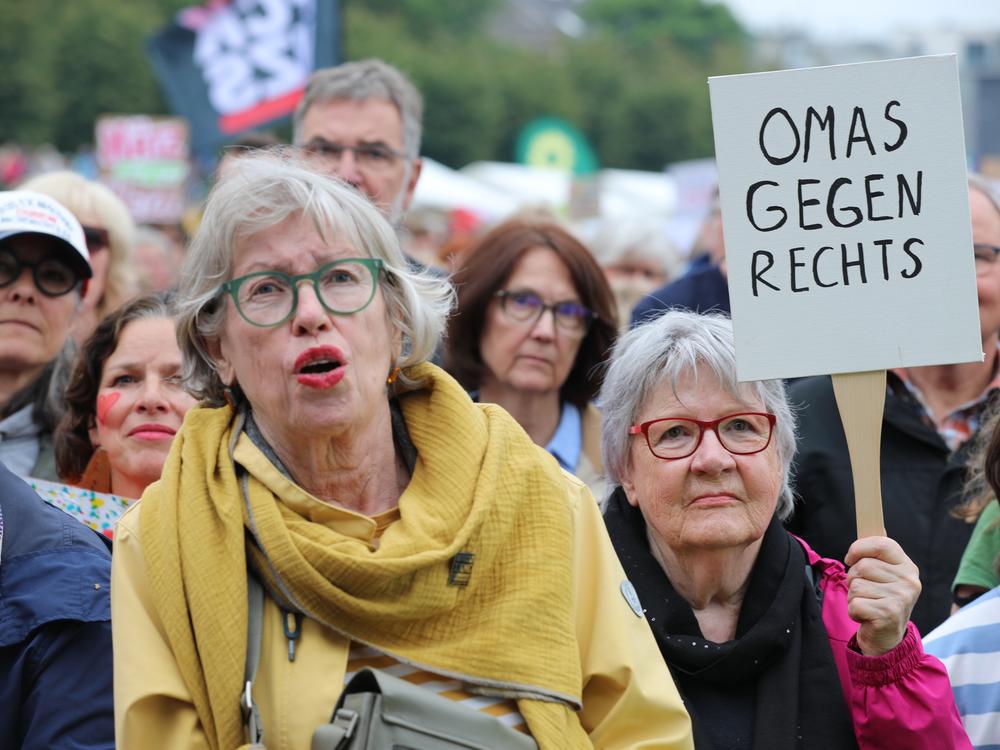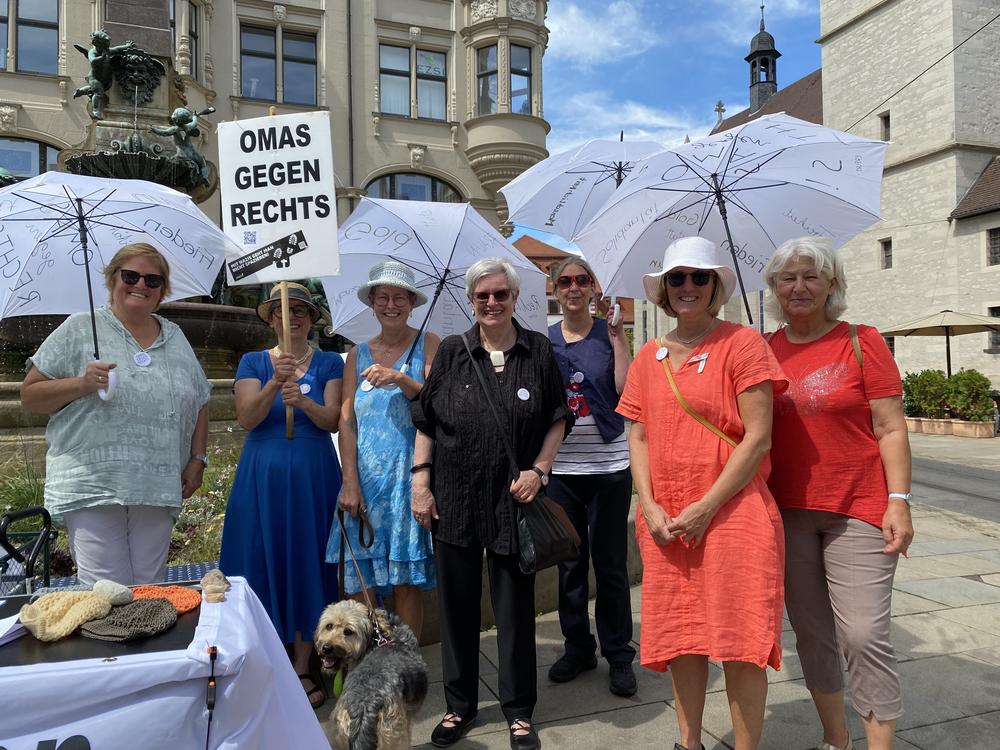Section Branding
Header Content
Germany's grandmothers take on the far-right ahead of key state elections
Primary Content
ERFURT, Germany — Amid the throng and bustle of Saturday shoppers in the cathedral city of Erfurt, a group of women in their 70s has gathered on a medieval market square, holding signs that read Omas gegen Rechts — Grandmas against the far-right.
They are part of a nationwide movement of tens of thousands of retired women who’ve had it with hatred, especially in the former East German state of Thuringia, where the far-right Alternative for Germany (AfD) party is leading the polls ahead of state elections on Sunday.
With many German voters stuck in algorithm-driven echo chambers, these senior women have taken to the streets to reach out to AfD supporters — rather than simply protest against them — in a bid to reconnect, revive debate and maybe even change minds. So far, though, their efforts are an uphill battle.
Among them is 76-year-old Gabriele Wölke-Rebhan, who cofounded the Erfurt chapter out of sheer worry. She points out that this region is where the Nazis gained their first political foothold in 1930, in the Thuringian state government, before seizing power nationally in 1933.
Now it’s where Björn Höcke — considered the AfD’s most extreme figure — is running to become the next state governor.
“Hitler happened because people stood by in silence,” Wölke-Rebhan warns. “If I stay silent now, I’m no better than my parents were in the 1930s.”
Wölke-Rebhan says she’s not just here to speak up, but to listen as well. She wants to understand why nearly one in three people here recently said they plan to vote AfD, even though Germany’s domestic intelligence agency tasked with protecting the constitution considers the party “extreme” and has placed it under surveillance. (In the last state elections five years ago, the AfD came third, behind former Chancellor Angela Merkel’s Christian Democratic Union and Die Linke, the socialist party that is a successor to former East Germany’s Marxist-Leninist ruling party).
Yet few AfD supporters are interested in discussing their voting behavior with her. Not everybody is willing to stop and chat. “The far-right ridicule us and think we’re just ‘silly old women,’” Wölke-Rebhan says. “What they don’t seem to understand is that women become unflappable with age. It’s a mistake to underestimate us.”
Wölke-Rebhan says the invisibility that tends to come with age has actually worked in their favor. Nobody expects respectable grannies to speak up, she says, so when they do, some are surprised enough to listen. At least for a while.
One of the grandmas is talking to a well-dressed man in his 70s. After a couple of minutes, he loses his temper and walks off, cursing at her. A couple of onlookers raise their eyebrows but don’t seem shocked by the outburst.
Wölke-Rebhan takes a deep breath and says she and her fellow grandmothers refuse to write anyone off as erbärmlich — “deplorable” — even if it’s tough at times.
“We get a lot of encouragement from passersby, but we also get a lot of abuse,” Wölke-Rebhan says. “It’s men of my generation who are the worst. They can be really below the belt. And they’re retirees, many of them living pretty comfortable lives.”
At the nearby farmers market, 79-year-old Rudi — who says he doesn’t trust the press enough to give his full name but is eager to talk — is doing his weekly shopping, picking through organic summer produce.
The retired engineer avoids the grandmas. He says no amount of chatting will change his mind.
“I’m voting AfD. It’s the only party that cares about us, the people who’ve always lived here,” Rudi says. “Right now, the immigrants rule. They come first. They’re treated better by the state than most Germans."
Support for the AfD has grown steadily since 2016, when Germany took in more than 1 million refugees, primarily from Syria, Afghanistan and Iraq. Initially, pictures of happy Germans welcoming refugees at train stations went viral but a backlash came as cities and local communities struggled to accommodate the new arrivals. The AfD has capitalized on this in the former East Germany, which, historically, has experienced less immigration than the former West Germany.
The party’s anti-immigrant and anti-Muslim rhetoric stokes fear in voters that newcomers are after their houses, jobs and daughters. This has only intensified since 2022, when more than a million Ukrainian refugees came to Germany. The AfD — which is against sending weapons to Kyiv and wants Germany to return to using Russian gas, which it stopped doing after Russia's full-scale invasion of Ukraine — exploits the historic affinity with Russia in formerly Communist East Germany.
Following fatal stabbings in Solingen last weekend, the AfD is expected to do even better in Sunday’s elections. The suspect is a 26-year-old Syrian man who turned himself in to authorities. The Islamic State group claimed responsibility for the knife attack, which killed three people. German authorities failed to deport the man last year after his asylum application was rejected.
Rudi insists that AfD voters are given a bad rap. “I’ve read what the mainstream media writes about us,” he says, referring to coverage of Björn Höcke’s repeated use of forbidden Nazi slogans at campaign rallies. “It’s all lies. I’ve stopped reading it.”
He says he now gets his news from Telegram and YouTube.
Rudi is exactly the kind of voter Marc Röhlig, a reporter for Der Spiegel, is trying to reach. His publication, Germany’s biggest news weekly, is one of the news sources Rudi now avoids.
Röhlig grew up in this region, shortly after German reunification in 1990. Now he writes about it, asking the questions he feels a journalist from western Germany couldn’t without seeming condescending. His articles focus on how many in the region feel left behind and never really adjusted to life in reunified Germany, and how those too young to remember Communist East Germany have almost inherited a feeling of resentment.
He says not all AfD voters have stopped reading his articles. “I used to receive anonymous threats, but with the rise of the far-right, people have become more brazen and now send me hate mail from their work addresses, cell number included,” Röhlig says. “So I’ve started calling them back!”
Röhlig says this takes his hate-mailers by surprise. “Confronting people takes the sting out of their hatred,” he says. “Most of the time, we find a way to talk to each other in a civil manner — and often end up chatting about personal issues and everyday worries.”
But Röhlig says it doesn’t always work and when he’s out reporting in the former East Germany — where his family still lives — he hears again and again the notion that Germany is not a democracy.
Gabriele Wölke-Rebhan, a grandma against the far-right who was in her 50s when East Germany ceased to exist, says she too is astonished when people her own age tell her that today’s Germany is a dictatorship. She laments that they’re simply repeating what the AfD claims, and questions whether they’ve forgotten what it was like in East Germany with the Stasi — the intrusive, oppressive secret police — and without democratic elections.
“When somebody complains they’re not free to say what they want, I ask them if they remember what it was like here before the Berlin Wall came down,” Wölke-Rebhan says. “If you’d railed against the party on the town square in those days, you’d have ended up in Bautzen — the local Stasi prison.”
She says this is why she takes to the streets every other weekend in an attempt to engage with passersby. She believes that many are simply lost in their digital silos dominated by hatred.
As she speaks, a passerby spouts abuse at the Grandmas, calling them scheußlich — hideous.
This time, barely an onlooker bats an eyelid. Wölke-Rebhan says Erfurt, her native city, has become more and more aggressive and people are used to it. She blames the AfD’s fear-mongering for the increased hatred, adding that it has become almost acceptable to mouth off in public the way many do online.
A recent study by the Berlin Social Science Center surveying more than 5,000 Germans between 2019 and 2021 found that “people who support the AfD are less satisfied with their personal and financial situation than supporters of other parties ... By contrast, those who turn away from the party feel an improvement in their well-being.” The researchers blame the AfD’s “negative rhetoric,” saying, “Those who turn to the party are more exposed to this negativity, and that is detrimental to their well-being.”
This can’t be said of Wölke-Rebhan and the other grannies, who, despite their worries, seem pretty happy with democracy. In this part of the country, they remember all too well what it was like to live without it.



